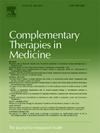针灸治疗乳腺癌患者失眠症的有效性和安全性:系统回顾和荟萃分析。
IF 3.3
3区 医学
Q1 INTEGRATIVE & COMPLEMENTARY MEDICINE
引用次数: 0
摘要
背景:乳腺癌相关失眠是乳腺癌患者最常见的症状之一,针灸已越来越多地被用于治疗。然而,目前还没有专门探讨针灸治疗乳腺癌相关失眠症的有效性和安全性的荟萃分析:本综述旨在通过荟萃分析对现有文献进行系统分析,以评估针灸治疗乳腺癌相关失眠症的有效性和安全性:方法:在六个医学数据库中全面检索了截至 2024 年 4 月的既往随机对照试验(RCT)。主要结果为匹兹堡睡眠质量指数(PSQI)得分。次要结果包括失眠严重程度指数(ISI)、睡眠起始延迟(SOL)、睡眠起始后唤醒(WASO)、总睡眠时间(TST)和睡眠效率(SE),后四项结果分别通过Actiwatch和睡眠日记进行测量:结果:共纳入了 7 篇文章,434 名参与者。荟萃分析显示,针灸可显著改善 PSQI 总分(MD 95%CI=-2.16[-2.88, -1.45], PC结论:针灸可部分缓解失眠:针灸可部分缓解乳腺癌患者的失眠症状。此外,针灸是安全的,在临床上可作为一种可靠的替代疗法。由于纳入的研究数量有限、异质性干预的潜在偏倚以及长期随访的方法学缺陷,应开展更多高质量、大样本量的研究来评估针灸治疗。本文章由计算机程序翻译,如有差异,请以英文原文为准。
Efficacy and safety of acupuncture for the treatment of insomnia in breast cancer patients: A systematic review and meta-analysis
Background
Breast cancer-related insomnia is one of the most common symptoms in patients with breast cancer, and acupuncture has been increasingly used in the treatment. However, there has been no meta-analysis that specifically explores the efficacy and safety of acupuncture in treating insomnia related to breast cancer.
Objective
The aim of this review was to systematically analyze the existing literature through a meta-analysis to evaluate the effectiveness and safety of acupuncture for breast cancer-related insomnia.
Methods
Six medical databases were comprehensively searched for previous randomized controlled trials (RCTs) up to April 2024. The Pittsburgh Sleep Quality Index (PSQI) score was the primary outcome. The secondary outcomes include the Insomnia Severity Index (ISI), Sleep Onset Latency (SOL), Wake After Sleep Onset (WASO), Total Sleep Time (TST), and Sleep Efficiency (SE), and the later four outcomes were measured by Actiwatch and sleep diary, respectively.
Results
A total of seven articles with 434 participants were included. The meta-analysis revealed that acupuncture produced a significant improvement in the total PSQI score (MD 95 %CI = -2.16[-2.88, − 1.45], P < 0.001), but had no statistical significance on ISI scores compared with controls (MD 95 %CI = -1.53[-3.97, 0.91], P = 0.22). From the Actiwatch, there was no substantial disparity observed in the enhancement of Sleep Onset Latency (SOL) (MD 95 %CI = -6.40[-13.19, 0.39], P = 0.06), Wake After Sleep Onset (WASO) (MD 95 %CI = -1.45[-7.09, 4.20], P = 0.62), or Total Sleep Time (TST) (MD 95 %CI = 3.54 [-4.71, 11.79], P = 0.40) between the experimental group and the control group. However, a significant distinction was observed in Sleep Efficiency (SE) improvement (MD 95 %CI = 2.43 [0.14, 4.72], P = 0.04). From the sleep diary, there was a significant difference in the amelioration of SOL (MD 95 %CI = -9.15[-16.48, − 1.81], P = 0.01), TST (MD 95 %CI = 29.92 [16.74, 43.10], P < 0.001), and SE (MD 95 %CI = 4.57 [1.92, 7.23], P = 0.0007) between the experimental group and the control group. However, no significant divergence was observed in the improvement of WASO (MD 95 %CI = 4.53[-4.81, 13.87], P = 0.34). All reported acupuncture-related adverse events were mild in severity.
Conclusions
Acupuncture can partially alleviate insomnia symptoms in breast cancer patients. Moreover, acupuncture is safe and may serve as a dependable alternative therapy in clinical settings. Owing to the limited number of studies included, potential biases of heterogeneous interventions, and methodological weaknesses of long-term follow-up, more high-quality RCTs with large sample sizes should be conducted to evaluate acupuncture treatment.
求助全文
通过发布文献求助,成功后即可免费获取论文全文。
去求助
来源期刊

Complementary therapies in medicine
医学-全科医学与补充医学
CiteScore
8.60
自引率
2.80%
发文量
101
审稿时长
112 days
期刊介绍:
Complementary Therapies in Medicine is an international, peer-reviewed journal that has considerable appeal to anyone who seeks objective and critical information on complementary therapies or who wishes to deepen their understanding of these approaches. It will be of particular interest to healthcare practitioners including family practitioners, complementary therapists, nurses, and physiotherapists; to academics including social scientists and CAM researchers; to healthcare managers; and to patients. Complementary Therapies in Medicine aims to publish valid, relevant and rigorous research and serious discussion articles with the main purpose of improving healthcare.
 求助内容:
求助内容: 应助结果提醒方式:
应助结果提醒方式:


